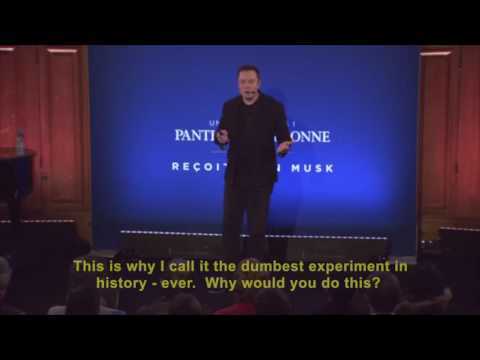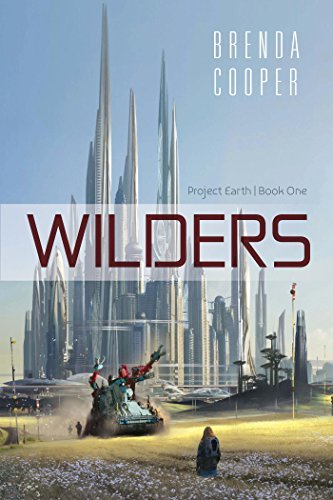Brian Burt's Blog: Work in Progress, page 2
February 22, 2018
#CauseForOptimism: Climate Change in 12 Minutes
So I especially enjoyed his short, crystal-clear explanation of climate change:
He puts this in the same blunt, accessible terms I remember from the classic nonfiction book Our Angry Earth: A Ticking Ecological Bomb, penned by two of my SF idols, Isaac Asimov and Frederik Pohl. After explaining that we will inevitably be forced to go down the renewable energy path (because fossil fuels are after all a finite, non-renewable resource) -- and displaying a jaw-dropping chart of how the CO2 level has exploded upward in the past few decades after 10 million years of minor fluctuations around 300 ppm -- he nails our current (at least in the U.S.) approach to carbon pollution without consequence as "the dumbest experiment in history - ever."
Who can argue with that assessment, when you consider what's at stake?
But, despite the scary implications of the current trend lines, I'm finding more and more cause for optimism. The price of solar and wind energy continues to fall, and adoption rates (even in the U.S., in the face of a total lack of federal leadership) continue to rise. And our younger generation (Generation Z?) gets it. You can see the energy (hopefully renewable? ;-) behind their efforts to exact justice against fossil fuel companies and/or intransigent governments in a series of lawsuits both in the U.S. and abroad:
Four climate change lawsuits to watch in 2018
So what does this mean? I think it means that the tide is turning. The younger generation fully appreciates the potential impact, and the effect it may have on them and their children; voters in many nations around the world are tired of hearing politicians dismiss the problem as a "hoax" or as "too expensive to address." Most of the globe is moving forward, determined to solve the problem. If the U.S. government is hell-bent on ignoring the reality, other countries are stepping up to lead the way. And everyday Americans are still working to advance the cause, in spite of the complete impotence of their elected leaders.
Our most innovative entrepreneurs are on board. Almost all world governments are on board. Our youngest, most visionary citizens are leading the way. That's a recipe for success, in my opinion. Very encouraging! I only hope and pray I live to see how the younger generation undoes the climate damage my generation has wrought.
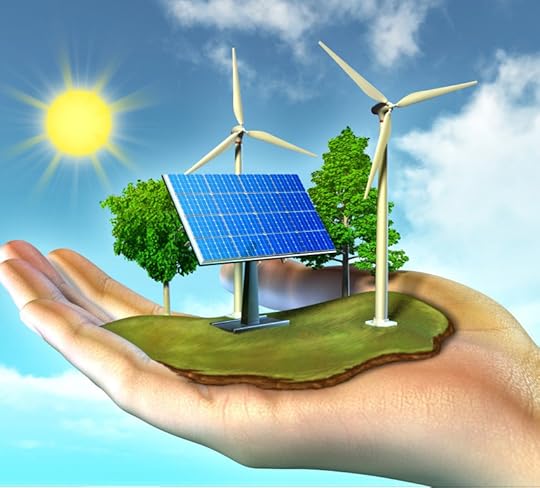
#SFWApro
November 12, 2017
Impostor Syndrome
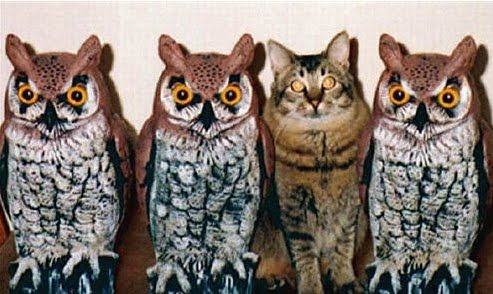
I love writing speculative fiction, but I work as a cybersecurity geek by day to pay the bills. I recently attended a hacker conference where one of the keynote speakers gave a fascinating, wide-ranging talk that touched on many topics. Toward the end, he (bravely) confessed to the audience that he himself struggled mightily with impostor syndrome -- the unshakable belief that he had somehow "faked" his way to a position of respect in his field, that he would inevitably be "found out" and ridiculed. He asserted that countless co-workers struggled with the same issue, that this problem was practically epidemic among his peers. He exhorted everybody in the audience to embrace their own abilities, to accept the fact that they weren't frauds and deserved to feel like talented, qualified professionals.
Boy, did that resonate. If it's true for cybersec geeks, I think it's true times ten for writers. For sure, that's the case for this writer. :-(
So here's my confession. I know I have some talent for writing. I've told some decent stories, won a few awards, garnered some nice reviews. But the reviews I remember -- the ones that dig their claws into my psyche and never let go -- are the ones that have unleashed the most biting, vitriolic criticism. And, yes: those leave me quivering inside, certain that I'm a blatant pretender in the world of fiction writing, that readers -- and fellow writers -- see right through the tattered facade.
That can be a crippling, debilitating feeling. It makes it hard to market or promote your work, to aggressively pursue opportunities to share your fictional creations with the world. It makes you cringe and blush when someone innocently asks "Are you making a lot of money on your books? Are you on the bestseller list? When does the movie come out?"
Sigh. "No. No. Probably never."
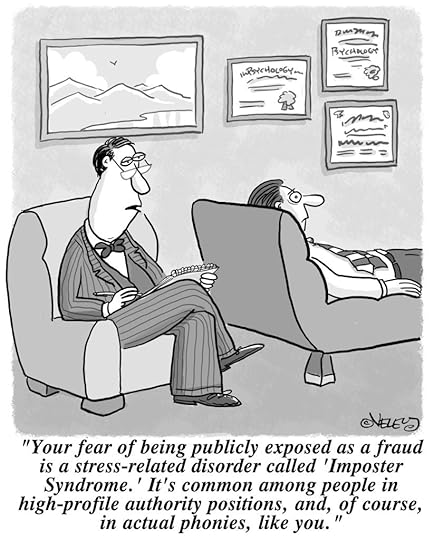
In researching this syndrome, I learned some interesting things. For example, it's estimated that two in five successful people consider themselves frauds, and that more than 70 percent of people struggle with these feelings at some point in their lives. I also discovered that, even among writers, I'm in good company:
"I have written 11 books, but each time I think, 'Uh oh, they're going to find out now. I've run a game on everybody, and they're going to find me out.'" — Maya Angelou
Wow. If someone of Maya Angelou's stature fights these kinds of self-doubts, then no one is immune!
Recognizing that you're not alone is half the battle. So, to all my SF-writing brethren out there who may, at least occasionally, battle the sneaking suspicion that you're not "genuine" authors, that your literary clothes are woven out of air and smoke, repeat this mantra after me:
- If I write, I'm a real writer.
- If I publish, I'm a real author.
- It takes courage to put my creations out there in the public domain, unarmored, to suffer the slings and arrows of critics and trolls. I am brave!
Don't give into the misgivings. They're a natural part of being human, being vulnerable, and caring about what you do. Don't let the pernicious fear of failure blunt your passion or quash your dreams.
Here's to everyone who paints with words and sculpts with sentences. Storytelling is a precious art. It infuses its magic into a confusing, chaotic world desperately in search of insight, meaning, or even just escape. The work may be fiction, but the value is real.
And so are you!
#SFWApro
October 15, 2017
#CauseForOptimism: Renewables Rock!

I can't deny that the environmental actions of the current U.S. administration -- and the President's highly publicized withdrawal from the Paris Climate Accord -- have demoralized me quite a bit. As an "eco-fiction" author, it's hard to find a silver lining in this particular dark cloud. Given the recent spate of devastating hurricanes and wildfires that have wreaked havoc in Texas, Florida, Puerto Rico, the Virgin Islands, and California, the USA is reeling... but our federal leaders still seem determined to ignore the evidence of catastrophic climate change.
Luckily, scientific groups and American business interests aren't as intent on jamming their heads into the (tar-) sand.
The first national-level, integrated assessment of the future costs and benefits of existing and expanded renewable portfolio standards (RPS) policies was just published in the journal Environmental Research Letters. And it clearly establishes that -- when it comes to energy policy -- good environmental practices are good for business.
This assessment projects that our nation will save hundreds of billions of dollars in net costs by pursuing renewable energy alternatives. So this approach doesn't just benefit the environment: it benefits our economy, our collective health, and the future prognosis for our planet. That's what I call a win-win-win proposition!
This, I think, is our inevitable path to a more sustainable energy future. We're reaching the point where the financial math pushes business leaders to do the right thing, regardless of their political views. That, in the end, is the way we all win.
So don't get discouraged, climate-fiction / eco-fiction fans. It seems more and more plausible that our collective story will have a happy ending!

#SFWApro
September 4, 2017
Storm Surge

Like most Americans, I watched with sympathy and shock as Hurricane Harvey slammed into the coast of Texas and dropped more than 50 inches of rain on Houston, a sprawling city utterly incapable of draining such prodigious amounts of water. The floodwaters rose, swallowing homes and cars and irreplaceable possessions without mercy. Terrified families were trapped in attics or on rooftops, rescued by first responders and the Cajan Navy and countless other brave, selfless volunteers. In the face of disaster, America once again showed its best, coming as close as it ever can to embodying its ideals. Hope refuses to drown. As the waters recede, we comfort ourselves with experts' assurances that we've just experienced a "thousand-year storm."
But -- honestly -- if we experience one of these "unprecedented" weather events every other year, isn't it time to ask ourselves why history seems to be accelerating, the span of millennia suddenly compressing into tighter coils that crush our most vulnerable: heat waves, drought, biblical downpours, juggernauts of wind and wave. We can't continue to dismiss them all as "storms of a lifetime" if they hammer us during every season.
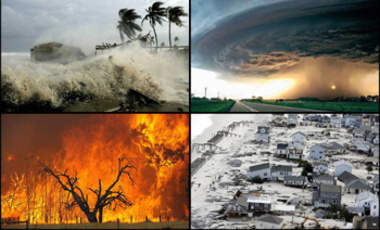
The world's climate scientists, and almost every other nation on the planet, understand and acknowledge the cause. Climate change pumps heat energy into our weather systems and spawns more frequent, extreme, traumatic events. "But climate isn't weather," counter skeptics; "you can't trace storms like Katrina, Sandy, or Harvey to global warming."
Actually, according to the latest U.S. federal climate change report, you can:
Yes, You Can Blame Climate Change for Extreme Weather
How did this issue become so insanely politicized in the U.S.? I don't fully know, nor do I care at this point. I just know that we need to change our political climate so we can deal with the hard decisions confronting us when it comes to our planetary climate. Is it fair to debate the policies for mitigating global warming, to discuss the economic implications vs. the benefits of reducing reliance on fossil fuels? Sure; in fact, it's vital. But we can't have that informed debate as long as we in the U.S. continue to insist that the problem doesn't exist, or that China manufactured it. And we can't have politicians carrying snowballs into the Senate chamber in winter to prove that "it still gets cold." That's behavior we wouldn't tolerate from a sulky pre-teen, much less an elected official who owes his constituents a lot more intellectual integrity than that.
My heart aches for the people of South Texas whose lives have been devastated in the wake of Hurricane Harvey. My family and I were happy to contribute to a fund to help them, sponsored through my generous employer who has pledged to match those donations dollar for dollar. Americans will do what they can to assist their suffering neighbors. But if we refuse to see the larger pattern woven by these mounting, cataclysmic weather events -- if we pretend they're isolated and unrelated -- we better steel ourselves to face a litany of similar suffering in the future.
Where will the next storm of the century, or the millennium, strike? When will the next heat wave broil a crowded city or the next drought wither crops to dust? Who knows. But, according to all the recent evidence, it will happen far too soon (and too often) for comfort. None of our communities will ultimately be immune.
As SF writers, and readers, we know better than to disregard the science. So spread the word. Don't let those around you ignore the warning signs. Fiction transports us to amazing worlds beyond imagination... but facing facts may be the key to saving this one.
#SFWApro
August 27, 2017
The Ultimate Eclipse: Nightfall

Last week was an epic, cosmic blast in the U.S. as the solar eclipse cast its sprawling shadow from the west coast to the east coast. I took the day off to celebrate with my family. We weren't lucky enough to be in the path of totality -- and we had intermittent clouds -- but it still represented a rare moment of celestial history. We got to our local library too late to score a pair of those precious eclipse glasses, but we did manage to watch the progress with a pinhole viewer my wife made from a Cheerios box. (Old school, baby!) And you could actually see countless images of the moon taking bites out of the sun from the light filtering through the leaves of trees. Of course, the repeated drama of totality streaming on NASA's video feed, beginning in Oregon and ending in South Carolina, took our breath away.
The next day, as my sons and I were walking after breakfast and chatting about the eclipse, my mind suddenly leapt back to a classic science fiction story inspired by a similar phenomenon. The great Isaac Asimov wrote his original novelette version of Nightfall in 1941; he collaborated with the brilliant Robert Silverberg to expand it into a full-blown novel in 1990. I still remember that story lighting up my imagination as a kid, like Baily's beads dancing along the rugged lunar limb.

Imagine living on a planet in a multi-star system where six suns trace their disparate paths across the sky, never leaving your world in darkness. Imagine that, every two millennia, a precise planetary alignment results in the lone sun being temporarily eclipsed. Imagine that -- as a lead scientist eagerly anticipating this cosmic event -- you learn from a colleague that archeological evidence now strongly implies that your world's civilization experiences cataclysmic collapse whenever that lone sun vanishes and darkness falls.
For anyone who relished the eclipse last week, this story remains magical. It, like the dazzling display of light and shadow we just witnessed, will leave you with a sense of awe. The novel is excellent, but I'm personally still partial to the original novellete. If you haven't had the pleasure, it's freely available in several places on the web, such as this one:
"Nightfall" by Isaac Asimov
I heartily recommend this if last week's eclipse whetted your appetite and left you hungry for more. When night falls on a world that knows only day, the implications can be both wonderful and terrible. Enjoy!

#SFWApro
July 23, 2017
Can Eco-Fiction Turn the Tide?

This is a scary time for the health of the planet. Earth’s biosphere is under stress from myriad human causes. Climate scientists have reached nearly unanimous consensus about the existential threat of human-induced global warming. Scientific organizations like the Union of Concerned Scientists, and activist groups like 350.org, fight to raise public awareness of the issue and its implications. While the entire biosphere is under siege, many believe that the oceans are the canary in the coal mine. Recent scientific surveys report that more than 70% of the Great Barrier Reef’s shallow water corals north of Port Douglas are now dead; 29% died from bleaching in 2016 alone.

These findings paint a grim picture for the oceans and the world. Still, the U.S. remains hopelessly embroiled in political debate over scientific facts that are accepted by almost all climate experts around the globe. Why? And how do we break the deadlock?
Scientific and environmental advocacy groups are certainly crucial to sway public opinion, and they continue to present the evidence. But polls have shown that too many Americans remain utterly entrenched in their beliefs on this issue, ignoring arguments to the contrary. A growing movement within fiction-writing circles hopes to shift hearts and minds in ways that rational debate simply hasn’t been able to achieve. The emerging literary genre of “climate fiction” (also known as “cli-fi”) or “eco-fiction” features gifted authors of traditional science fiction, fantasy, and mainstream fiction who are channeling their imaginations to portray the potential future of an Earth ravaged by climate change.
Renowned mainstream writers like Barbara Kingsolver (Flight Behavior) and Margaret Atwood (Oryx and Crake) have contributed novels that strike a chord with readers, affecting them on a visceral level that rational scientific argument simply hasn’t yet been able to duplicate. Of course, science fiction lovers like myself would argue that this is nothing new; brilliant SF authors like Frank Herbert (with his Dune series) and Kim Stanley Robinson (with his Mars series) have been dramatically illustrating the vital importance of environmental stewardship for decades.
My own award-winning science fiction trilogy, Aquarius Rising, explores a future Earth where global warming, and a disastrous attempt to reverse it, have forced humans to adapt to radically altered ecological niches. The bulk of the action takes place in the coastal shallows of the Eastern Pacific Ocean, where human-dolphin hybrids called Aquarians have built thriving reef communities amid the ruins of drowned human cities. This is no utopia by any means. Genetic engineering (biosculpting) is vital to allow the Aquarians to combat the ravages of ocean acidification and rising temperatures. They face an ongoing threat from human scientists clinging to the desiccated lands who strive to resurrect the continents at any cost. It is a brutal, bruising vision of one possible future we might face if we fail to act soon to mitigate climate change. While it offers hope for a successful outcome, it presents a cautionary tale that is representative of the works within this vibrant new literary genre.
Can fiction of this kind succeed where raw, unadorned facts have failed to convince so many Americans? I don’t honestly know. But I do believe in the power of story, of imagination, to move us. So do many, many fiction writers across many genres. Climate change is daunting when it acidifies our oceans, destroys ancient reefs, melts polar ice, and leads to relentless sea level rise that threatens to swallow coastal cities. Let’s hope that the combination of science fact and fiction can succeed where either, alone, seems doomed to fail.

#SFWApro
July 10, 2017
#CauseForOptimism: Declaration of Independence
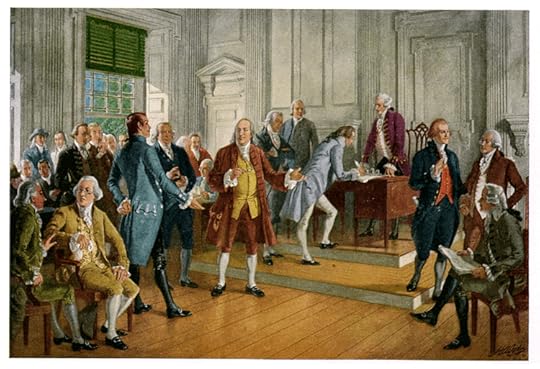
As an SF writer, I have great respect for the scientific method. Rational debate based on facts and evidence are a healthy way to consider an issue from different angles, to reach consensus on causes... and, more importantly, on solutions.
So why, in America, have we completely lost the ability to apply this process to political science?
We all know our politics are a mess right now. We're all frustrated with the lack of progress, the utter inability to move forward. But I do see cause for optimism. It feels like we're approaching a critical mass of Americans who are fed up enough with both major political parties to start looking for civil, respectful alternatives to trench warfare.
Me? I'm declaring independence. Neither party deserves my loyalty or allegiance at this stage of the game; they aren't earning it and haven't for a long, long time. As far as I'm concerned, we need to treat them all, Republican or Democrat, with complete skepticism until they prove they deserve our vote. And that should be a probationary vote, contingent on actually cooperating across the aisle to implement solutions to the very real, very scary problems we face as a nation. If they sit around bashing the other side and making excuses about why they can't get things done -- or, worse, if they brag about blocking the other side -- then they forfeit the right to any vote in the future.
Both parties are guilty. Both parties have some good ideas. And both are essential to actually doing anything significant to benefit their broader, shared constituency. I think many in Congress want to work together, to actually get stuff done. So it's our job, as voters, to support the ones who bridge the partisan divide and not punish them. It's our job to reward commonsense compromise instead of treating it as treachery. That's the way we all win, in the end. That's how big problems get solved.
So here are two very cool organizations that are working to make that a reality. Check them out, listen to what they have to say. Then consider declaring your independence, too.
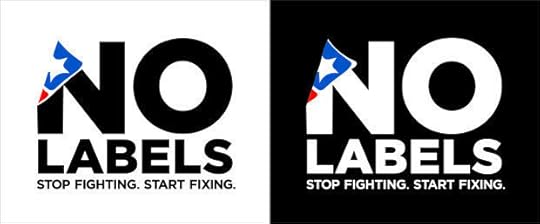
NO LABELS
No Labels was founded by a frustrated mix of Republicans and Democrats who were fed up with the dysfunction in D.C. and decided to take action. They've recruited members of Congress from both major parties in equal numbers to join their Problem Solvers Caucus, a group of legislators who pledge to work across the aisle to find common ground and get things done. They're still a minority in Congress... but their ranks are growing, and their message resonates with voters. Find out more about them, and support their cause!

BETTER ANGELS
The mission of Better Angels is to depolarize the American electorate -- to bring voters from both sides of the political divide together, convince them to have an actual conversation, and show them how much they have in common. Radical concept, eh? It's worked wonders in cities all around the country, getting Republicans and Democrats to stop shouting at each other and actually have meaningful discussions. Many have even wound up becoming friends. Check 'em out!
# # #
Science fiction has always pushed us out of our comfort zones, taking us beyond the traditional boundaries into unexplored territory. Unfortunately, civil discourse and functioning government now seem more alien and fantastical than Tatooine. It doesn't have to be that way. If enough of us refuse to accept any more "us vs. them," maybe we can force our political leaders to once again act like adults. In the real world, every day, we all accept the fact that we need to work together and compromise to get our jobs done.
It's way past time that folks in Washington got real.
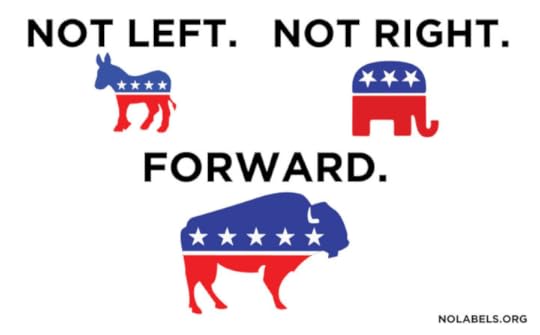
#SFWApro
June 24, 2017
Completing the Trifecta
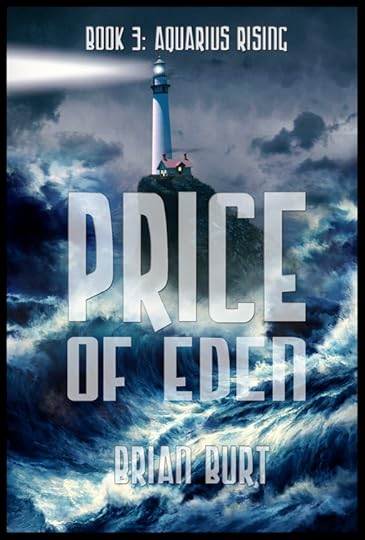
I well remember the days when I'd never written any story longer than a novella, when contemplating that first novel felt like standing at the base of Mount Everest, gazing up at the unreachable summit through the haze of an approaching blizzard. Was I scared then? Nah... I was terrified!
Years have passed. Book 1 of the Aquarius Rising Trilogy , In the Tears of God, hit the virtual bookshelves and actually ended up winning EPIC's 2014 eBook Award for Science Fiction. Book 2, Blood Tide, followed and won the 2016 Readers' Favorite Gold Medal for Science Fiction. Book 3 needed to tie up all the loose ends and avoid disappointing those loyal readers who stuck with me through the first two books. Gulp...
Did I mention that writing can be terrifying?
Well, Book 3, Price Of Eden, is now out from Double Dragon Publishing. The trifecta is complete, despite the obstacles that daily life hurls at each of us! I hope it provides a conclusion that satisfies series readers; I know it's given me a wonderful sense of fulfillment to see it on the interwebs.
Early reviews are promising. Readers' Favorite has awarded it 5 stars, which I find very encouraging. You can see the entire review (and supporting reviews) here:
Readers' Favorite - Book Review of Price of Eden
Thanks again to everyone who has offered encouragement, provided feedback, and/or nagged me about when the final installment would be released. Let's hope that the third time is the charm! ;-)

#SFWApro
June 10, 2017
The World of Wilders
Recently, I was honored to receive an Advance Readers Copy of science fiction author Brenda Cooper's latest novel, Wilders. I thoroughly enjoyed reading it and found the world it explores, and its major characters, to be fascinating! I’d like to share this world with my blog followers, so let’s dive in.
# # #
Hi, Brenda. First, please excuse one “SF fanboy” question up-front. As I reviewed your writing resumé, I admit I was a bit awed. What was it like to collaborate with a science fiction legend like Larry Niven on a writing project?
He’s brilliant. He’s particularly brilliant at plot and big ideas, and to this day he’s better at both than I am. He’s also a good collaborator, who does his share of work (at least). Since I was a brand new writer at that time, he taught me a lot. I was really very lucky.
Now to Wilders: you paint a vivid picture of a (not-too-distant?) world in which humanity struggles to recover from unrestrained exploitation of our natural resources that has pushed us to the brink of extinction as a species. Many humans have retreated to the relative safety of domed “megacities” that provide a refuge from the harsh conditions of a devastated land. Seattle, Washington, and Vancouver, British Columbia, have combined resources to create “Seacouver,” a home to millions (or billions). How far in Earth’s future do you envision this world residing? How much of it do you consider purely a cautionary tale vs. a plausible (and harrowing) potential reality?
That’s really a lot of questions! Although I didn’t name a date quite as specifically as Kim Stanley Robinson names 2140, I set Wilders roughly fifty years into the future. I think we could very well be in a world like this by the late 2060’s. People are already moving into cities. E.O. Wilson’s Half-Earth: Our Planet's Fight for Life lays out the steps we need to take to re-wild better than I’ve seen anywhere else. I already had the idea that I wanted a lot of empty land, but when I read Half Earth part way through the first draft of Wilders, I chose to amp up that aspect of the future world I was creating.
On some level, Wilders has to be a cautionary tale since even fifty years out is a long time when you look at the speed of change right now. It’s plausible if there are no other wildcards – no other things we just don’t see. As a futurist, I know there will be. Some technology or new ability of phase shift in politics will make the real world even more different fifty years from now than I’ve depicted here.
The amount of climate change is plausible. I don’t see any way forward where we escape climate change since carbon emissions are not – so far – easily reversible. We can’t wake up one day, change our ways overnight, and have the atmosphere change back to something safer a day later. But Wilders is actually fairly positive. In its world, we found ways to limit carbon. But not until sometime in our future – and another decade or more of wanton burning of fossil fuels will doom many ecosystems as we know them today.
Coryn Williams, the protagonist, is a compelling character touched by tragedy at a tender age. We’re introduced to her when both her parents die on the cusp of her junior high school graduation. She and her older sister Lou are orphaned, isolated, and Lou’s departure for a “rewilding” engagement outside the city leaves Coryn utterly alone except for her companion robot, Paula. The subject matter and themes of this story are very mature, but this does have elements of a young adult novel in terms of the protagonist’s perspective. Did you imagine this as a tale primarily aimed at young adults, or is the main character’s youth incidental? Do you sometimes feel that this age group offers us the greatest hope for dealing with the climate crisis in the real world?
I have a habit of starting my characters young. I did that in The Silver Ship and the Sea and The Creative Fire. But Wilders is meant as an adult book, although one that I hope teens also read. It is about a post-climate change Earth, but it’s also about robotics. One of the key themes is our dependence on technology, and Coryn starts this book quite dependent on her robotic companion. There were two choices for that – dumb, or young. I chose young. A girl and her robot go into the woods…. So Wilders is aimed at all ages, and Coryn’s age was a choice.
Younger people offer a great hope for for the future, at least if we teach them how to hope. I think we had better not wait for them though, we had better act now.
You draw a stark contrast between the world of “Inside,” where megacity-dwellers have the advantage of ubiquitous technology and expansive material comforts, and “Outside,” where wilders fight to resurrect blighted ecosystems while average people fight simply to survive the challenges of extreme weather, depleted resources, failing infrastructure, and violent competition for food and shelter. In spite of their apparent comforts, many Insiders struggle against a malaise that often leads to suicide while Outsiders seem to live with more vigor, despite the lethal hardships they face. Is this intended to draw a distinction between physical health and mental health, between sustaining the body and the spirit? How have your own experiences living in the Pacific Northwest inspired this viewpoint?
Well, I love Seattle. Truly. I don’t live in it – I live on an acre and half outside of the city, but we’re close enough to go in for meetings, events, and social nights out. So I don’t think the issue is about living in the city vs. living in the outside. I think it’s about dependence of technology, and about goals and dreams. Inside of my future cities, people are on a basic income. They have to contribute something for that, but it’s not much. They CAN earn more for more sophisticated jobs, so there is upward mobility. But people don’t need to strive very hard. Cities – even today – can be lonely places. Future Seacouver is mostly a fabulous place, and many people have great lives there. They even have a space program. But others struggle with first world problems. Depression, loneliness, malaise – these are more problems of the rich than the poor. Outside, there’s little time to focus on loneliness and no one is sending you enough money to live on. At some level, I believe humans are better off when they have concrete goals about something greater than themselves. Whether that’s Lou saving buffalo or unhappy people fighting the cities, the people outside have goals. So yes, at some level, I think many of them are healthier. Great question.
Julianna Lake, the former mayor of Seattle and one of the founders of Seacouver, is another strong character. She’s mysterious, hard for Coryn (and the reader) to pin down, but we sense that she’s conflicted over the tension between the worlds of “Inside” and “Outside.” Who or what inspired this pivotal character? Did your own experience in government inform the way you shaped her, her motivations, and her concerns for her people?
I love Julianna. I didn’t expect her. But I have had a conversation with myself over the ultra-rich and powerful for a long time. They can solve problems others can’t (think the Gates Foundation) but the huge split in income in America today is very bad for us. Julianna is rich (as are almost all politicians), but she’s passionate even in her waning years where we see her in Wilders. At one point (way too late to change) I thought I should have written the book about Julianna and Jake instead of Coryn. I love Coryn’s story, and she’s a good introduction to a world that will become more complex as I write more in it, but maybe I will eventually write a whole novel about this fictional woman I didn’t know anything about until I was halfway through the first draft of Wilders.
The Wilders are “environmental stewards” charged with healing the ravaged landscape and restoring decimated animal and plant species so that the Outside can once again sustain a healthy population, both human and otherwise. Although they live fairly primitive lives in many ways (riding horses as their primary mode of transportation, living modestly in ranch-style housing), the Wilders leverage powerful technology called ecobots to assist them in their mission. How do you see natural and technological forces being combined to solve the problems faced by your main characters in the world of Wilders?
Well, we will need technology. Absolutely. A friend and fabulous futurist, Gray Scott, introduced me to the idea of ecobots. I’ve written a lot about robotics, and I am certain they will be part of our future. I see that as both good and bad, and as complex.
We will need technology to make headway on our environmental problems. We’ll tag bigger mammals. We may need nano-bees to pollinate. We’ll certainly use sensors. We may need geoengineering (scary, but likely nonetheless). We’ll use drones. We are already doing most of this on some level. We’re tool users, and we can make pretty fine tools these days. Imagine what we can do in fifty years?
I’m a cybersecurity professional by day. Hackers (or crackers) play a key and nuanced role on both sides of the central conflict between Insiders and Outsiders in Wilders. How dangerous do you consider hacking in a modern, interconnected world, both in the novel and in your real-world IT experience?
It’s truly, deadly dangerous. I’m responsible for IT security for a city (my staff is directly responsible, but I am accountable and I consider it a crucial part of my job). We are attacked constantly. We are attacked by thieves, by state-actors, by children, by terrorists, by pranksters, and by organized crime. The nation’s banking, government, transportation, utility, and other infrastructure is in severe danger. We spend a lot of time and effort on security and so does every IT vendor. What if the world were a kinder place and all that effort could go to something positive?
That said, I think hacking will continue to be a part of life. I hope we find a way to make that less so, but systems are powerful, and power attracts idiots. By the actual time of Wilders, I suspect systems will be quantum and access will be almost all biometric, but I didn’t waste time in the book dealing with that since that’s not what the book is about.
Along those lines: the megacities in Wilders — in particular, Seacouver — are more than just sophisticated systems of networked infrastructure. And Paula, Coryn’s companion robot, appears much more than simply a “personality simulation.” What role does artificial intelligence play in the world of Wilders?
Smart cities – all of the successful cities of the future – will rely on interconnected systems where the reaction time needs to be faster than humans can provide. So we’ll need very, very smart computer systems with tight interfaces. For the moment, I’ve left the question of just how smart these systems might be open. Perhaps I’ll come back and answer that more deeply.
Science fiction has a rich history of ecological or environmental tales, from Frank Herbert’s Dune and Kim Stanley Robinson’s Mars Trilogy to Ursula Le Guin’s The Word for World is Forest. (And I believe Ms. Le Guin is a Pacific Northwesterner like yourself? ;-) What science fiction stories have most inspired you when it comes to environmental themes? How did they shape your thinking as you crafted Wilders?
Yes, Ursula lives up here. Yes, Ursula is wonderful. I’ve met her once, and listened to her speak more than once, but we seldom see her out any more. I love her work. I read every story in the climate change anthologies Loosed upon the World: The Saga Anthology of Climate Fiction and I'm With the Bears: Short Stories from a Damaged Planet. I’ve read almost everything Kim Stanley Robinson ever wrote. I’ve read Paolo Bacigalupi’s work and Tobias Buckell's work. I read a lot of science writing on the topic as well. I also read fiction writers like Rick Bass and poetry on the topic. I’m probably most inspired by Robinson and Bacigalupi and Buckell. They do their homework, and they produce fabulous worlds. I’m kind of a worldbuilding nut – it’s one my favorite parts of writing.
I see that the cover art for Wilders says that this is Book 1 of Project Earth. How many novels do you foresee in this series, and when might we see the next one?
Well, I know there will be one more, probably June or July of 2018. There’s a lot more to explore. I’d like to write the book about Julianna, and to write about some other parts of the country and the world in this future. Whether or not I will be able to do that depends on the audience. This is business, and if enough readers love this world, I’ll be able to continue writing in it.
It’s been a pleasure speaking with you, Brenda, and learning about your fictional worlds. I look forward to reading more of your novels!
# # #
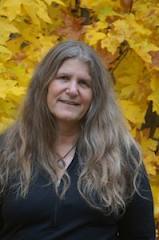
Brenda Cooper is an award-winning author of science fiction and fantasy as well as an IT professional and a well-known futurist. You can learn more about her and her published works on her web site. Her latest novel, Wilders can be purchased on Amazon and through other major online booksellers.
#SFWApro
May 21, 2017
Tricolor Mars

Red-green-blue (RGB) is the additive color model that drives electronic display systems. It paints our computer screens and infuses the incredibly vivid images that dance across modern televisions. It also describes the color-coding scheme for one of the most brilliant science fiction trilogies of all time. If you've not had the pleasure of reading Kim Stanley Robinson's award-winning Mars Trilogy, carve out time to do so. This is an SF saga you can't afford to miss!
The scope and sweep of the Mars Trilogy -- Red Mars, Green Mars, and Blue Mars -- will steal a reader's breath away. The saga covers two centuries of Martian history as it traces the adventures of the First Hundred, the initial group of scientists and engineers who struggle against daunting odds to colonize Mars. Robinson's imaginative world-building and attention to scientific detail are second to none, but what sets him apart are his facility with language and his insight into the softer sciences that power so much of character-driven fiction. He is rightly lauded for his ecological and environmental themes, the way his Martian settlers reshape their inhospitable planet and pioneer new cultural and political structures to provide a more open, free society than exists on their home world. Readers can marvel at the global changes that gradually transform the Martian landscape, differentiating it from the inequities of Earth and ultimately leading to a struggle for independence from the repressive "metanational" corporations that rule the governments back home... and covet the valuable resources of the Martian colony world.

The science, the ecosystems engineering, and the societal evolution are all fascinating. Still, what makes this trilogy even more compelling is the cast of disparate, colliding characters through whose eyes the reader sees the story unfold. The First Hundred (and their descendants) include calm, pragmatic engineers; enigmatic, mystical metaphysicists; fiery, passionate leaders; and introspective, geeky scientists. None of these key characters are caricatures or stereotypes. They defy expectations, are tormented by conflicting waves of emotion; they are uncertain and flawed and admirable and pitiable, undoubtedly recognizable examples of people in the reader's own life. Who better to accompany you through three lengthy novels, several centuries of toil and tribulation, and the creation of a new world?

If you enjoy science, space, and the spirit of exploration, you owe it to yourself to feast on this decorated trilogy that won two Hugos and a Nebula Award. It deserves every accolade it and its author have received. I very much enjoyed Andy Weir's The Martian and NatGeo's dramatic Mars miniseries. These were both brilliant... but they were undeniably inspired by Kim Stanley Robinson's groundbreaking epic published more than two decades earlier. The original Mars trilogy has lost none of its relevance, especially as we on Earth struggle with our own environmental challenges and accelerating climate change.
With red, green, and blue, you can concoct a dazzling array of colors. With Red, Green, and Blue Mars, you can explore a mind-boggling vision of the future. Taste the rainbow!
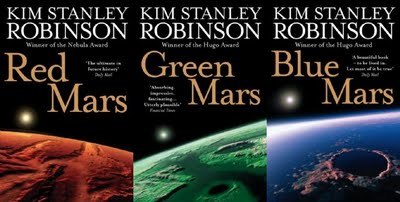
#SFWApro
Work in Progress
- Brian Burt's profile
- 51 followers


